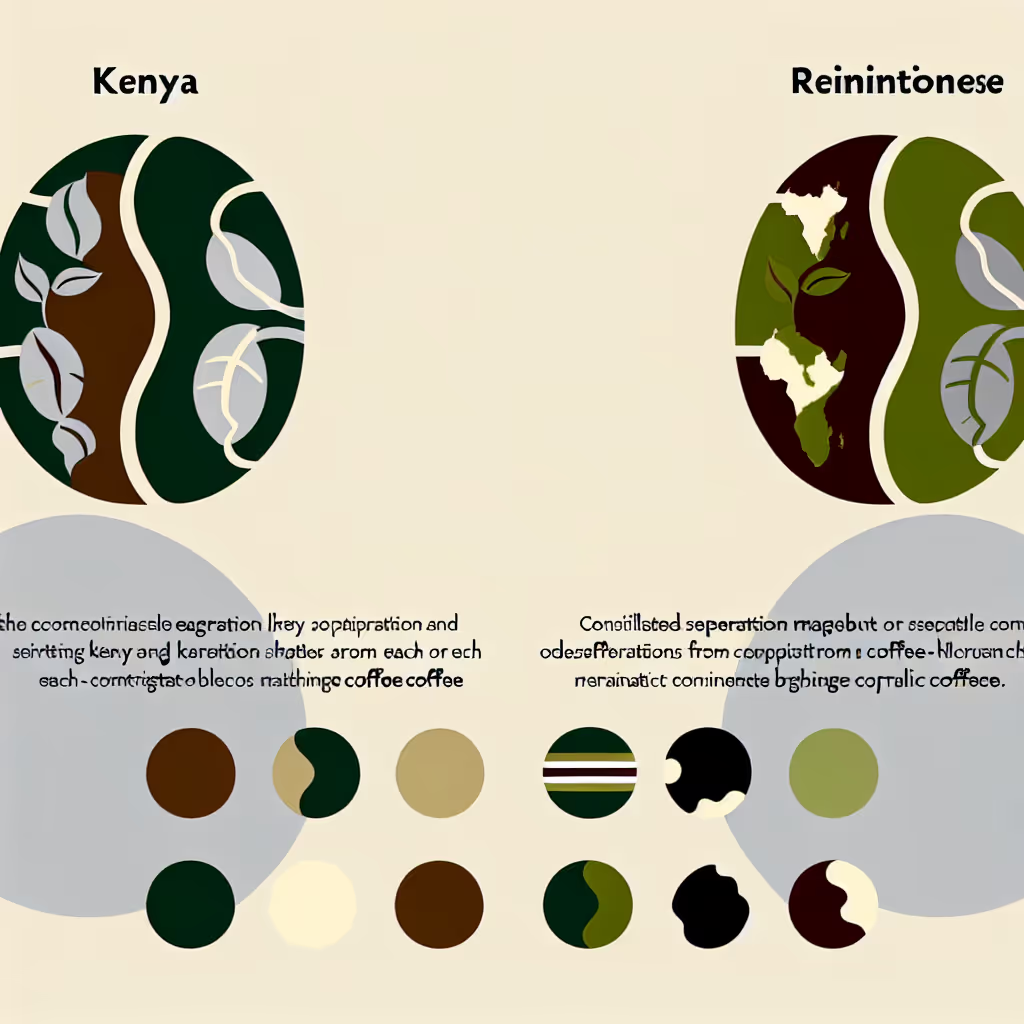Kenyan Vs. Zimbabwean Coffee
This comparison explores the distinct qualities of Kenyan and Zimbabwean coffees, highlighting their flavor profiles, growing conditions, and brewing methods to help coffee enthusiasts make informed choices.

Brief Description
Kenyan coffee is renowned for its bright acidity, full body, and complex flavor profile. Grown in the rich volcanic soils of the Central Highlands, these beans benefit from ideal climate conditions and meticulous processing. The result is a cup that's bold, wine-like, and often described as the 'connoisseur's choice'. With notes ranging from blackcurrant to citrus, Kenyan coffee offers a truly unique and memorable tasting experience.
Zimbabwean coffee is a hidden gem in the world of specialty coffee. Grown in the lush Eastern Highlands, these beans are known for their bright acidity, full body, and complex flavor profile. Despite facing challenges in recent decades, Zimbabwe's coffee industry is experiencing a revival, producing high-quality beans that are gaining recognition among coffee enthusiasts worldwide. The unique terroir and traditional farming methods contribute to the distinct character of Zimbabwean coffee, making it a must-try for those seeking new and exciting flavor experiences.
Importance of Comparison
Comparing Kenyan and Zimbabwean coffee origins is crucial for coffee lovers seeking to explore the diverse flavors of East African beans. Both regions offer unique taste experiences, influenced by their specific terroirs and processing methods. Understanding these differences helps consumers expand their palate, appreciate the nuances of specialty coffee, and make informed purchasing decisions based on their flavor preferences.
Key Attributes
Origin
Kenyan
Zimbabwean


Consumer Guide
When choosing between Kenyan and Zimbabwean coffee, consider your flavor preferences. Kenyan coffee is known for its bright acidity and complex profile with notes of blackcurrant and citrus, ideal for those who enjoy a bold, wine-like cup. Zimbabwean coffee offers a balanced experience with citrus, caramel, and floral notes, perfect for those seeking a smoother taste. For brewing, both origins excel in pour-over and French press methods. Kenyan beans are particularly suited for cold brew, while Zimbabwean beans perform well in espresso. Consider the altitude and processing methods: Kenyan beans are typically grown at higher elevations and undergo double fermentation, while Zimbabwean beans offer a variety of processing options, including natural and honey methods.
Expert Opinions
Coffee expert James Hoffmann notes, 'Kenyan coffee often represents the pinnacle of brightness and complexity in the cup, while Zimbabwean coffee is an exciting rediscovery, offering a unique balance of acidity and sweetness.' Barista champion Lem Butler adds, 'The revival of Zimbabwean coffee is bringing new flavors to the specialty scene, complementing the established reputation of Kenyan beans. Both origins showcase the best of what East African coffee has to offer.'
FAQs
Kenyan coffee is known for its bright acidity, full body, and complex flavors of blackcurrant and citrus. Zimbabwean coffee offers a balanced profile with notes of citrus, caramel, and floral undertones. Kenyan coffee tends to be bolder and more wine-like, while Zimbabwean coffee is often smoother and more approachable.
Kenyan coffee is typically grown at higher altitudes (1400-2100m) in the volcanic soils of the Central Highlands. Zimbabwean coffee is cultivated in the Eastern Highlands at slightly lower elevations (1200-2000m). Both regions benefit from ideal climate conditions, but the specific terroir contributes to their unique flavor profiles.
Both Kenyan and Zimbabwean coffees excel in pour-over and French press methods, which highlight their complex flavors. Kenyan beans are particularly well-suited for cold brew, enhancing their bright, fruity notes. Zimbabwean beans perform exceptionally well in espresso, offering a balanced and nuanced shot.
Kenya has a much larger coffee industry, producing around 50,000 metric tons annually. Zimbabwe's coffee production is significantly smaller, at approximately 500 metric tons per year. This difference in scale affects availability and sometimes price, with Zimbabwean coffee often being rarer and potentially more expensive.
Kenyan coffee is typically processed using the washed method, often with a unique double fermentation process, followed by sun-drying. Zimbabwean coffee offers more variety in processing, including washed, natural, and honey methods. These different processes contribute to the distinct flavor profiles of each origin.
Kenya has long been renowned for its high-quality coffee production. Zimbabwe's coffee industry, while historically significant, has faced challenges in recent decades. However, it's currently experiencing a revival, with increasing recognition for its quality beans. Kenya's industry is more established, while Zimbabwe's is in a phase of exciting rediscovery and growth.
Conclusion
Both Kenyan and Zimbabwean coffees offer unique and exciting experiences for coffee enthusiasts. Kenyan beans are ideal for those seeking a bold, complex cup with bright acidity and distinctive fruity notes. Zimbabwean coffee appeals to those looking for a balanced, smooth profile with a mix of citrus, caramel, and floral notes. While Kenya's coffee industry is more established, Zimbabwe's revival is bringing new and intriguing flavors to the specialty coffee scene. Ultimately, trying both origins will expand your coffee palate and deepen your appreciation for the diverse flavors East African beans have to offer.






